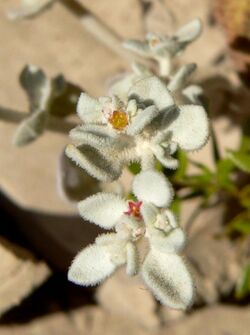Biology:Tidestromia suffruticosa
From HandWiki
Short description: Species of shrub
| Tidestromia suffruticosa | |
|---|---|

| |
| Flowers | |
| Scientific classification | |
| Kingdom: | Plantae |
| Clade: | Tracheophytes |
| Clade: | Angiosperms |
| Clade: | Eudicots |
| Order: | Caryophyllales |
| Family: | Amaranthaceae |
| Genus: | Tidestromia |
| Species: | T. suffruticosa
|
| Binomial name | |
| Tidestromia suffruticosa (Torr.) Standl.
| |
| Synonyms[1] | |
| |
Tidestromia suffruticosa, the shrubby honeysweet,[2] is a perennial plant in the family Amaranthaceae of the southwestern United States and northeastern Mexican deserts. It has one of the highest rates of photosynthesis ever recorded.[3] It flowers from April to December.[3] It can survive very high temperatures, growing successfully in extreme environments such as Death Valley,[4] and the genetic basis for this is being studied with a view to making hardier crop plants to better cope with climate change.[5]
Subtaxa
The following varieties are accepted:[1]
- Tidestromia suffruticosa var. oblongifolia (S.Watson) Sánch.Pino & Flores Olv.
- Tidestromia suffruticosa var. suffruticosa
References
- ↑ 1.0 1.1 "Tidestromia suffruticosa (Torr.) Standl.". Board of Trustees of the Royal Botanic Gardens, Kew. http://powo.science.kew.org/taxon/urn:lsid:ipni.org:names:253350-2.
- ↑ "Tidestromia suffruticosa". Natural Resources Conservation Service PLANTS Database. USDA. https://plants.usda.gov/core/profile?symbol=TISU. Retrieved 10 December 2015.
- ↑ 3.0 3.1 "Green and Brown Flowers". Mojave desert wildflowers: a field guide to wildflowers, trees, and shrubs of the Mojave Desert, including the Mojave National Preserve, Death Valley National Park, and Joshua Tree National Park. Rowman & Littlefield. 2013. p. 260. ISBN 978-0-7627-9388-4.
- ↑ "Photosynthetic adaptation to high temperatures: a field study in death valley, california". Science (New York, N.Y.) 175 (4023): 786–789. February 1972. doi:10.1126/science.175.4023.786. PMID 17836139. Bibcode: 1972Sci...175..786B.
- ↑ "Flower that thrives in Death Valley may hold secret to heat adaptation.". New Scientist. 3 August 2023. https://www.newscientist.com/article/2385302-flower-that-thrives-in-death-valley-may-hold-secret-to-heat-adaptation/.
Wikidata ☰ Q15556082 entry
 |

